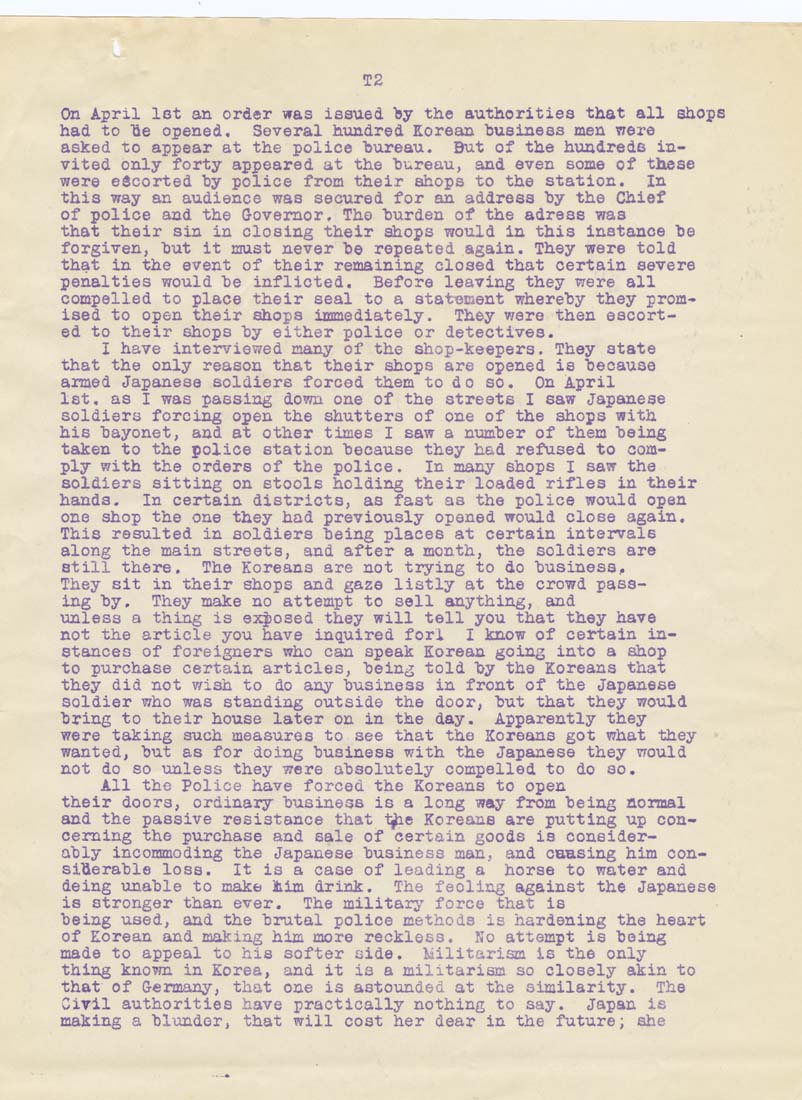T2
On April 1st an order was issued by the authorities that all shops
had to be opened. Several himdred Eorean business men were
asked to appear at the police bureau. But of the hundreds in¬
vited only forty appeared at the bureau, and even some of theae
were escorted by police from their shops to the station. In
this way an audience was secured for an address by the Chief
of police and the Governor. Tho burden of the adress was
that their sin in closing their shops would in this instance be
forgiven, but it must never be repeated again. They were told
that in the event of their remaining closed that certain severe
penalties would be inflicted. Before leaving they were all
compelled to place their seal to a statement whereby they prom¬
ised to open their shops immediately. They were then escort¬
ed to their shops by either police or detectives.
I have interviewed many of the shop-keepers. They state
that the only reason that their shops are opened is because
armed Japanese soldiers forced them to d o so. On April
1st, as I was passing down one of the streets I saw Japanese
soldiers forcing open the shutters of one of the shops with
his bayonet, and at other times I saw a number of them being
taken to the police station because they had refused to com¬
ply with the orders of the police. In many shops I saw the
soldiers sitting on stools holding their loaded rifles in their
handa. In certain districts, as fast as the police would open
one shop the one they had previously opened would close again.
This resulted in soldiers being places at certain intervale
along the main streets, and after a month, the soldiers are
still there. The Koreans are not trying to do business.
They sit in their shops and gaze listly at the crowd pass¬
ing by. They make no attempt to sell sinything, and
unless a thing is exjosed they will tell you that they have
not the article you have inquired fori I know of certain in¬
stances of foreigners who can speak Korean going into a shop
to purchase certain articles, being told by the Koreans that
they did not v/ish to do any business in front of the Japanese
soldier who was standing outside the door, but that they would
bring to their house later on in the day. Apparently they
were taking such measures to see that the Koreans got what they
wanted, but as for doing business with the Japanese they would
not do so unless they were absolutely compelled to do so.
All the Polioe have forced the Koreans to open
their doors, ordinary business is a long way from being normal
and the passive resistance that t^e Koreans are putting up con¬
cerning the purchase and sale of certain goods ia consider¬
ably incommoding the Japanese business man, and caasing him con¬
siderable loss. It is a case of leading a horse to water and
doing unable to make him drink. The feeling against the Japanese
is stronger than ever. The military force that is
being used, and the brutal police methods is hardening the heart
of Korean and making him more reckless. No attempt is boing
made to appeal to his softer side. Militarism is the only
thing known in Korea, and it is a militarism so closely akin to
that of Germany, that one is astounded at the similarity. The
Civil authorities have practically nothing to say. Japan is
making a blunder, that will cost her dear in the future; she
|








